Judaism Inward Or Outward? The Great Debate #1
Yosef, Yehuda and the Chanukah Story
The outdoor Chanukah Menorah at Namal Tel Aviv in Israel
Vayeishev/ Chanukah Class
- December 6, 2015
- |
- 24 Kislev 5776
Rabbi YY Jacobson
9626 views- 11Comment
- Call-in
Listen to the class on the phone
Call +1 (845) 201-1933
When prompted, dial the ID number below.
2621 MP3 MP4 Source Sheets - Copy Embed
Leilu Nishmat Reb Eliyahu Tzion ben Reb Chananya Niasoff ז"ל
And in the merit of our partner in Torah Yigal Yisroel ben Sofia שיחיו
Class Summary:
The Midrash describes an odd detail in Greek persecution of the Jews during the time of the Chanukah story: The Jew’s were forced to write a renunciation of their faith on the ‘horn of an ox.’ What on earth did the poor ox have to do with this sorry chapter in Jewish history?
Kabbalistic and Chassidic thought offers a fascinating answer to this question by tying the story of Chanukah directly to the story of Joseph’s fierce dispute with his brothers. This dispute has lasted for thousands of years, with important implications today.
The children of Jacob were divided into two factions: on one side were ten of the twelve brothers, led by Judah; on the other, Joseph, whose differences with his brothers were the cause of much pain and strife in Jacob’s family. The conflict between Joseph and his brothers ran deeper than a multicolored coat or a favorite son’s share of his father’s affections. It was a conflict between two worldviews, between two approaches to life as a Jew in a pagan world.
We learn of the Greeks’ perversion of Joseph’s perspective on Judaism, the importance of oil this holiday, and how we set things right each Chanukah by sharing the light and the oil with the world around us.
Vayeishev/ Chanukah Class
Rabbi YY Jacobson
- December 6, 2015
- |
- 24 Kislev 5776
- |
- 9626 views
Leilu Nishmat Reb Eliyahu Tzion ben Reb Chananya Niasoff ז"ל
And in the merit of our partner in Torah Yigal Yisroel ben Sofia שיחיו
Classes in this Series
Please help us continue our work
Sign up to receive latest content by Rabbi YY
Join our WhatsApp Community
Join our WhatsApp Community




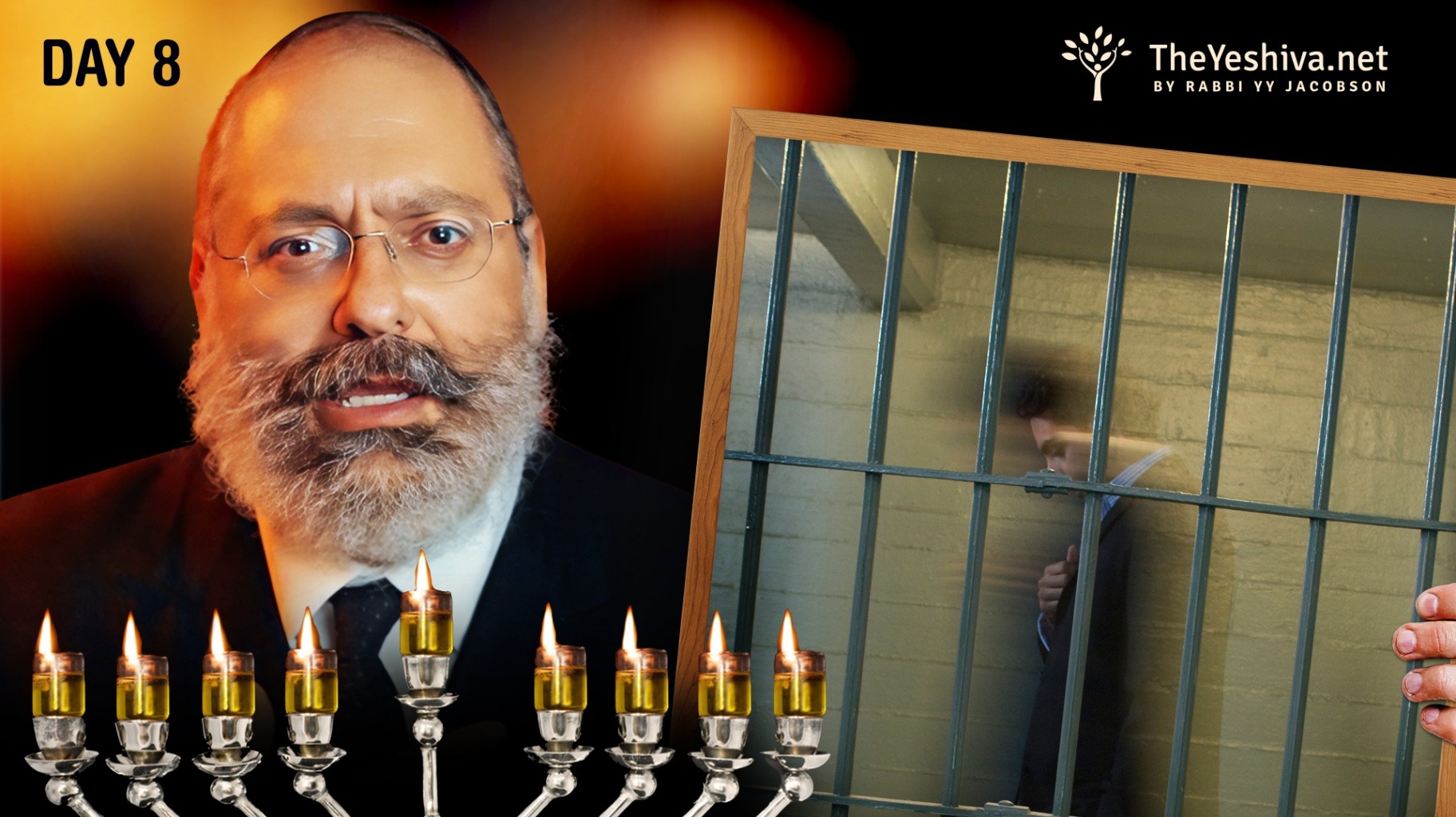
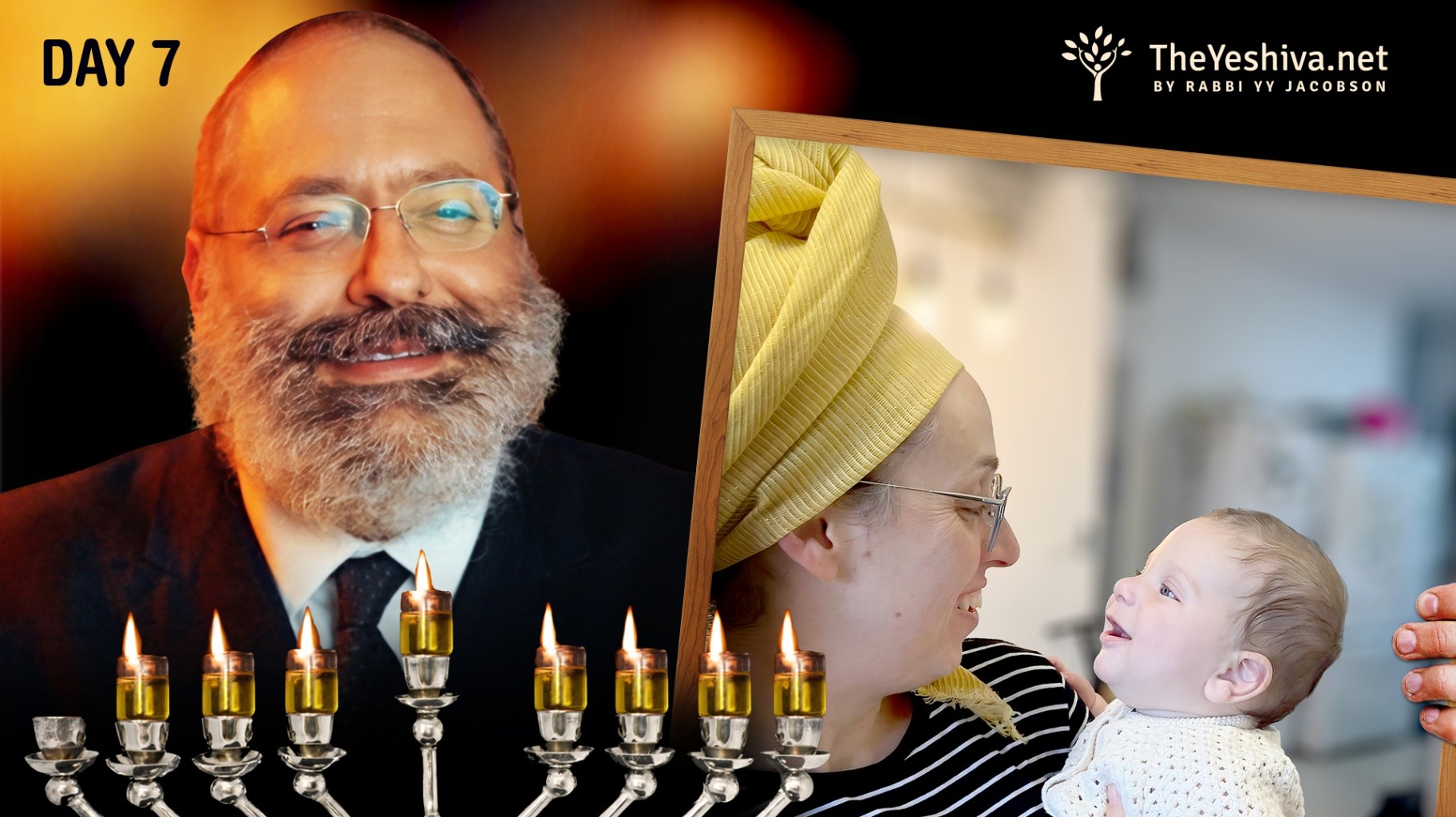
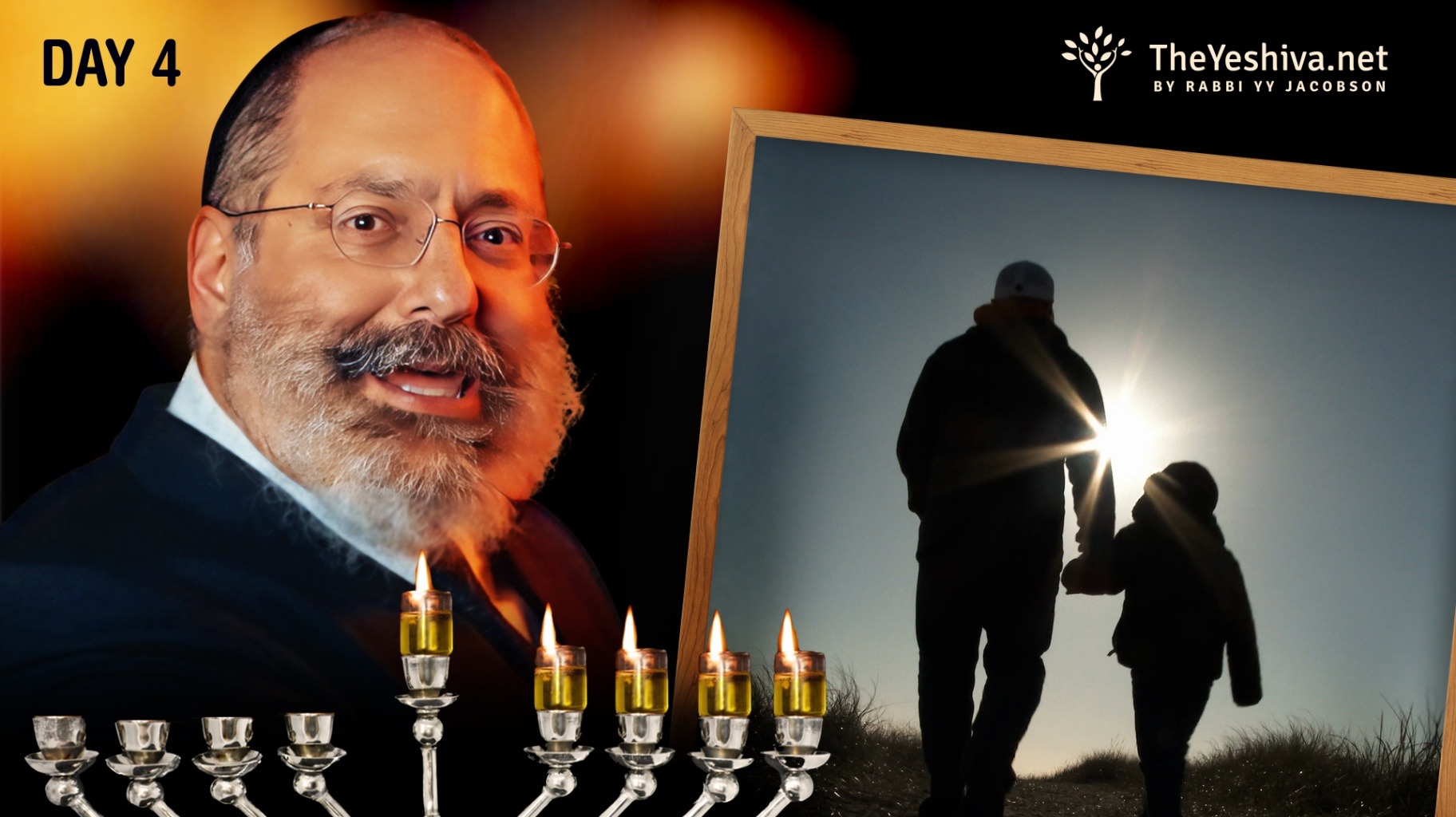
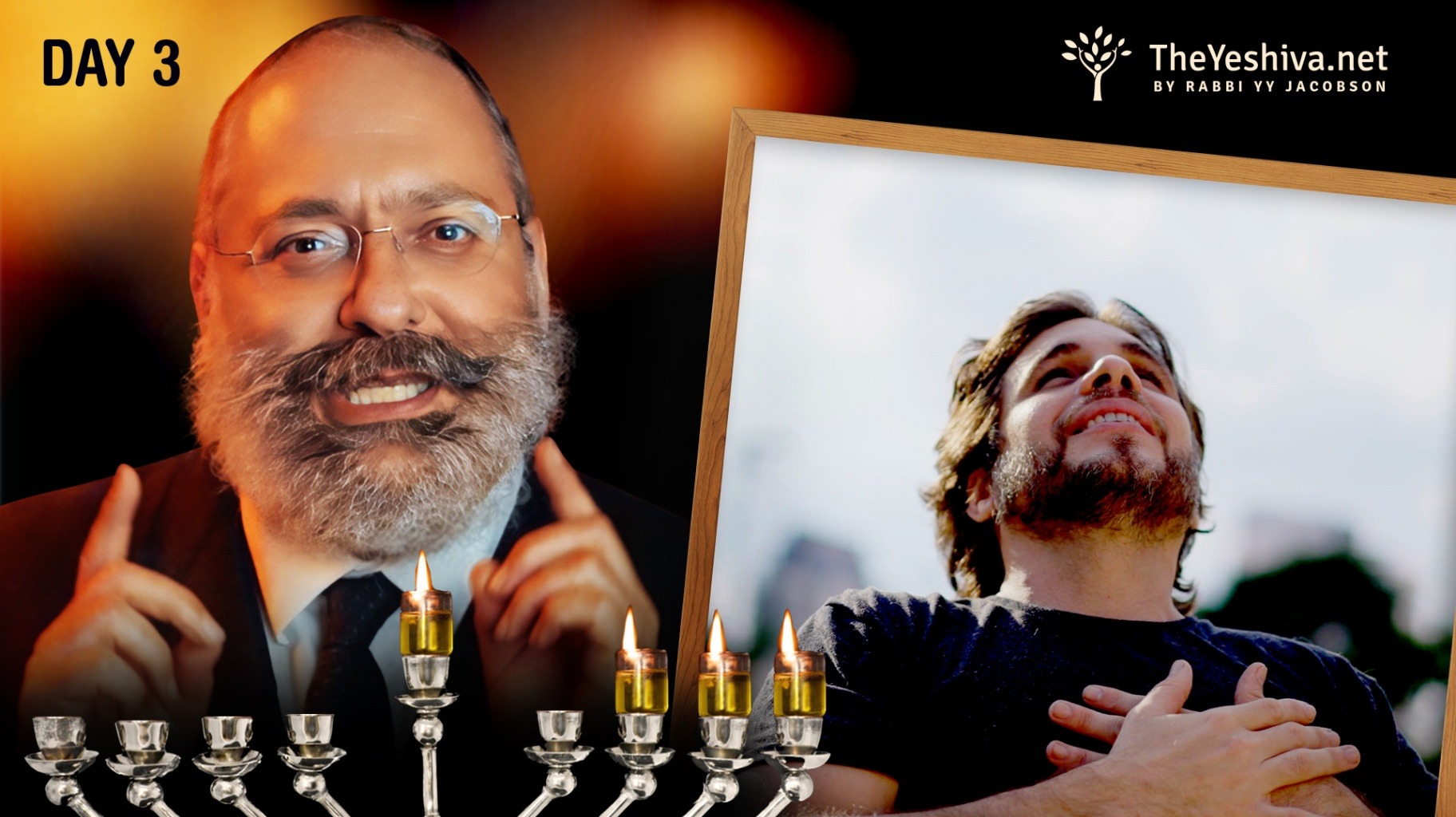
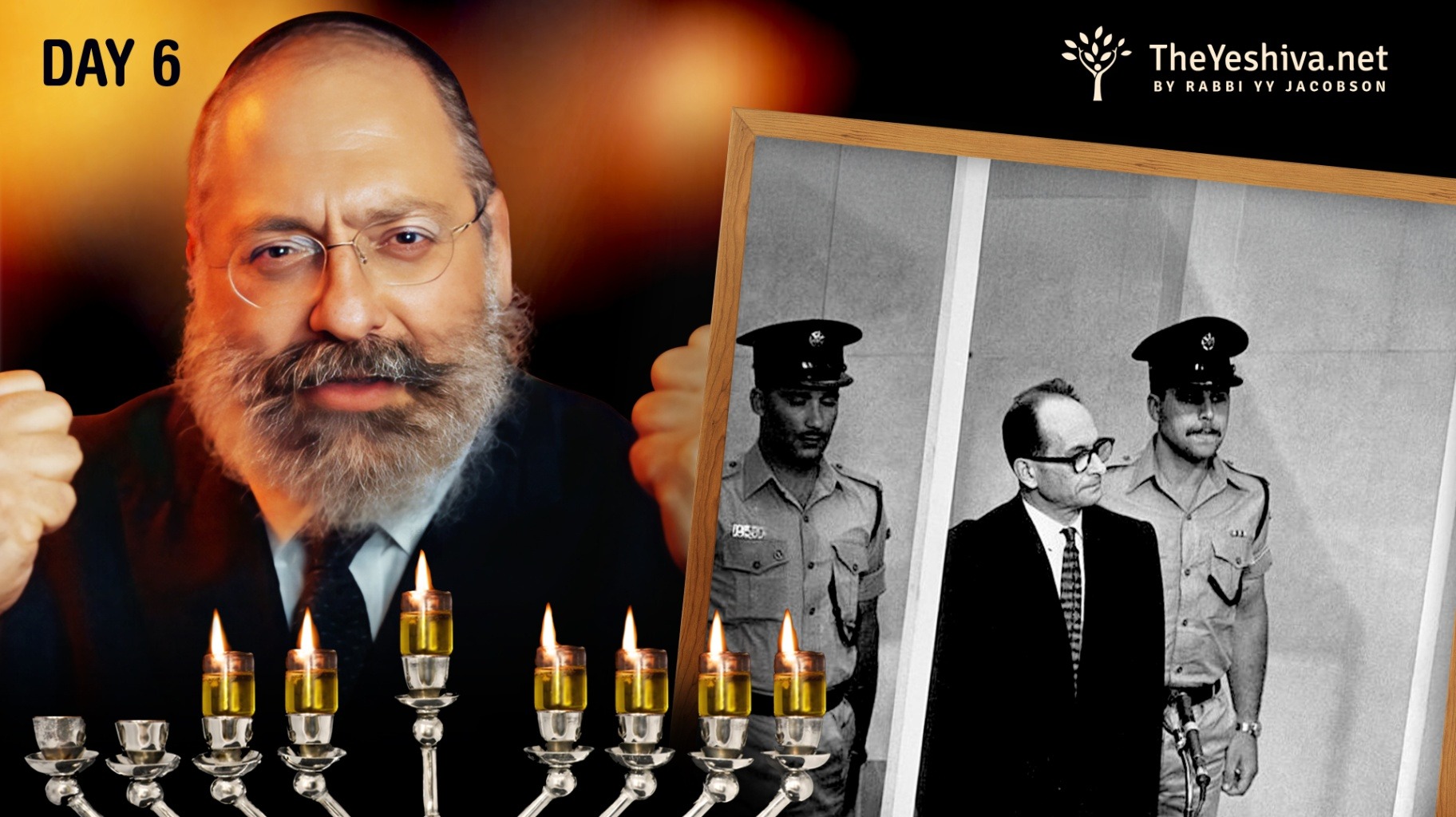
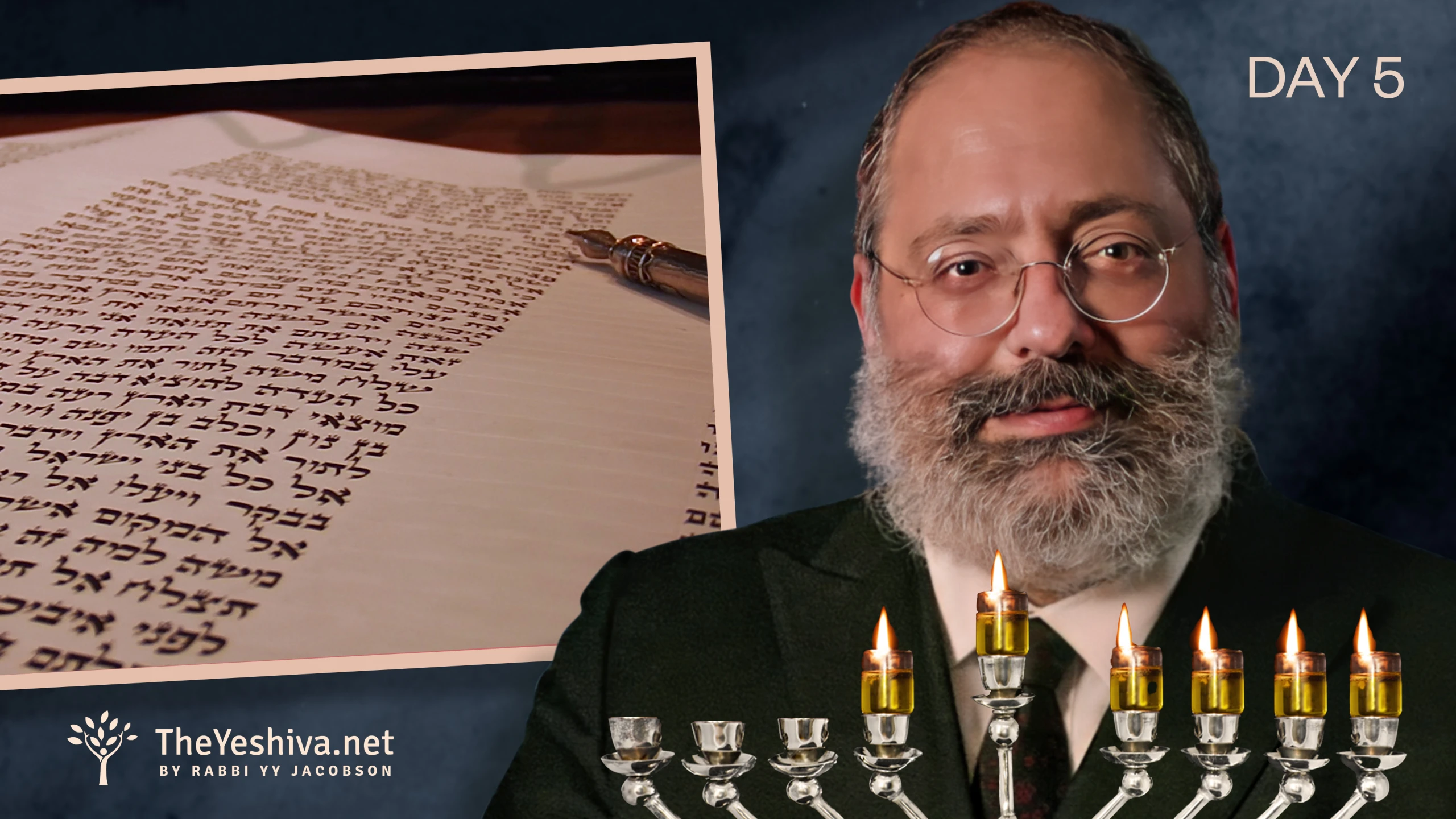
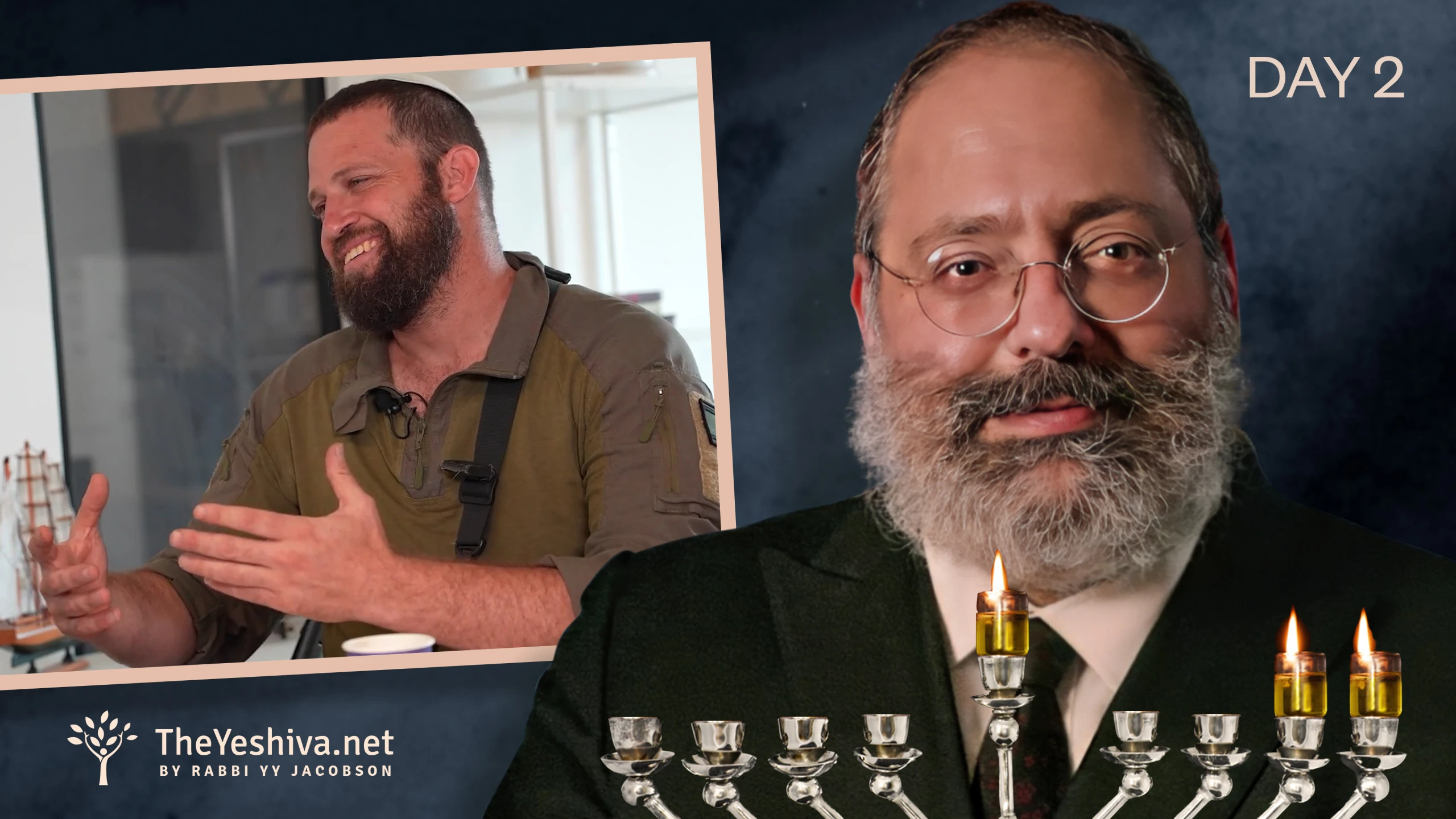
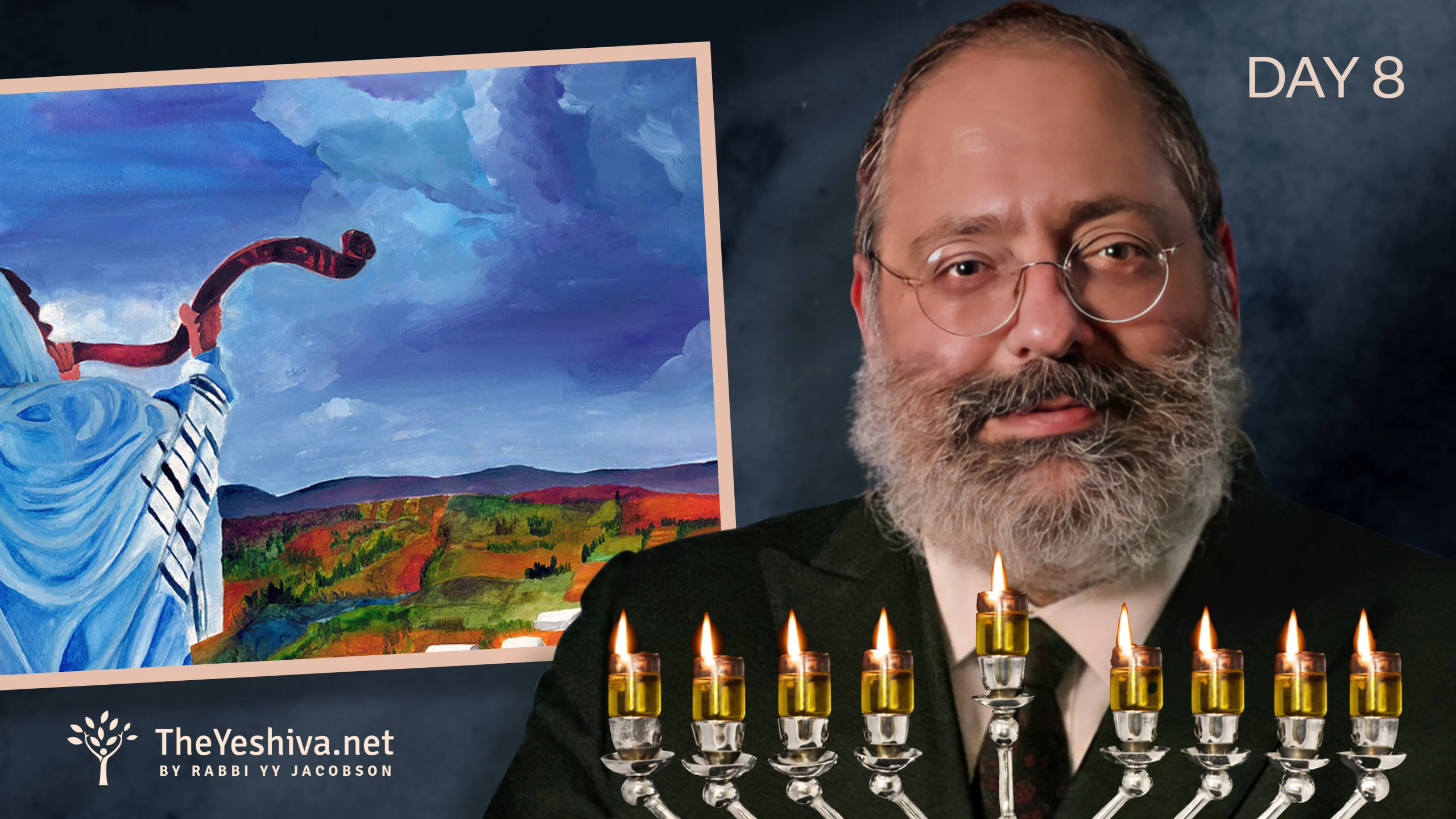
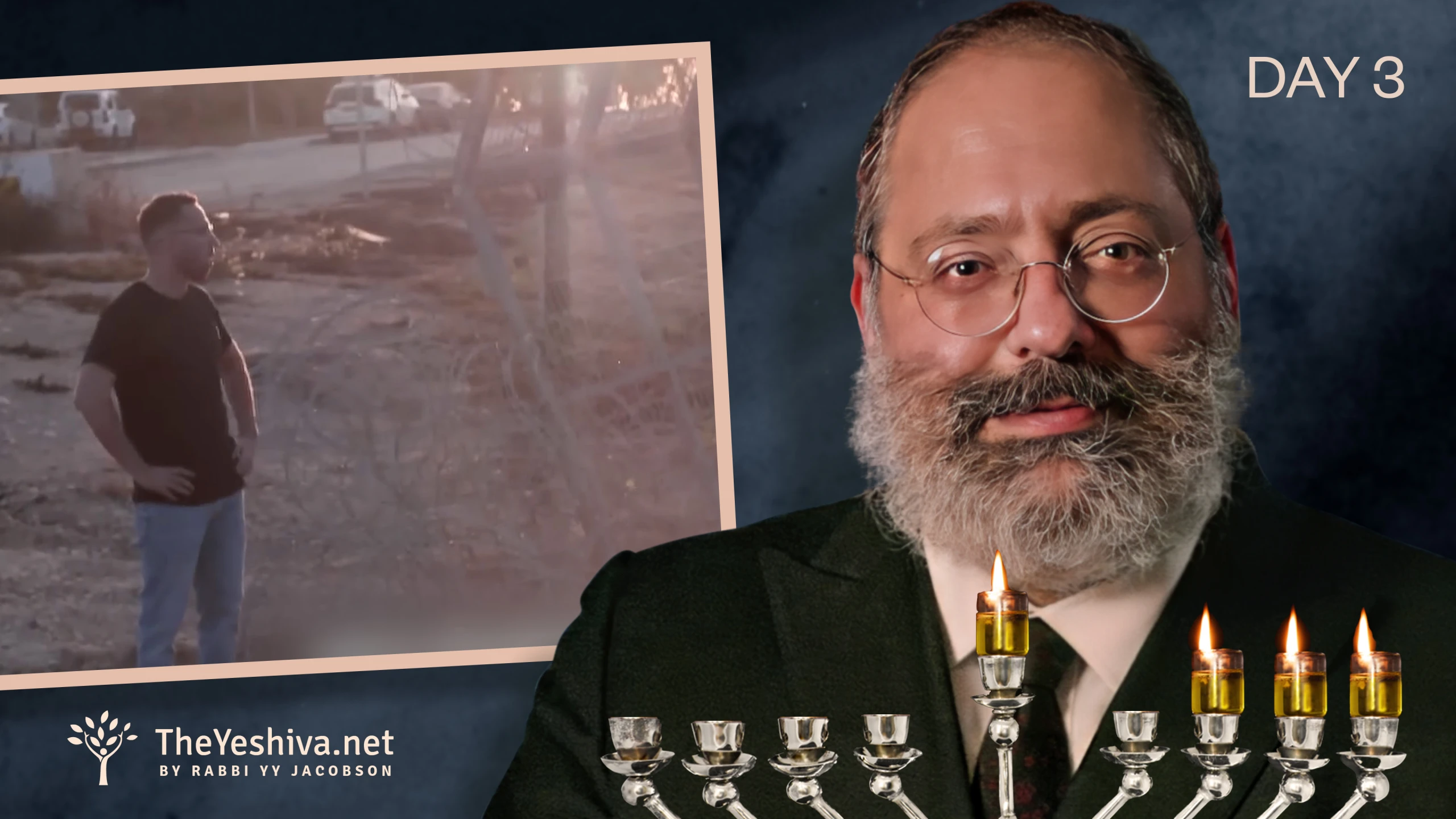
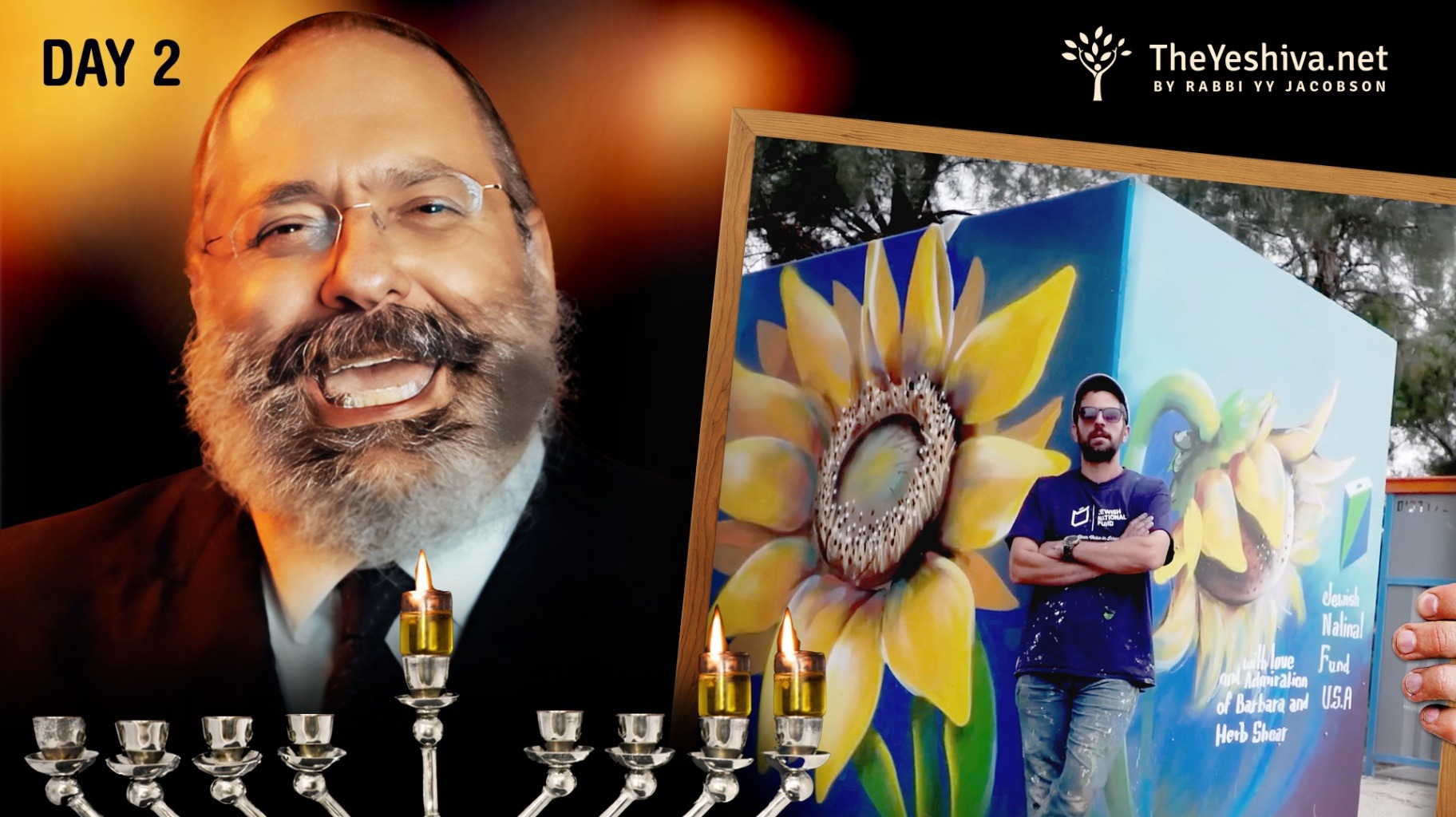

Please leave your comment below!
Michoel Aryeh Rosen -2 years ago
Chanukah Sameach Please remnd us the Pasuk refering to Yoseph which the Roshei Tevot spel Chanukah
Reply to this comment.Flag this comment.
Yisroel Press -3 years ago
Fascinating lecture with a deeper understanding of the divide between Joseph and his brothers. What is the Jewish perspective towards mankind.
To survive in Galut the Joseph view is essential spread our ethics to the nations of the world is ultimate goal.
Reply to this comment.Flag this comment.
Anonymous -7 years ago
olo timnoso
fits nicely with what u spoke earlier about Timna was a Pilegesh. Timna from the word menia and meakev
Reply to this comment.Flag this comment.
Nosson -7 years ago
The Great Debate
Reply to this comment.Flag this comment.
Shmuel C -7 years ago
Self-nullification vs self-expression
Dear Rabbi,
You mentioned in a passing subtle way, that Yehuda and Yosef both experience a challenge with an intimate relationship, Yosef with the wife of Potifar and Yehuda with Tamar.
The fascinating insight is quite cosmic. Yosef experiences a challenge that is at the very fabric of his ideological mission statement, accept diversity at its core and glean the unity within diversity, granted he passed.
But Yehuda is challenged with the very ideological opinion (Yosefs) that he did not accept to embrace as the primary approach to a Jewish people who have begun the exile.
Yehuda is now tested with a relationship that is forbidden and he must admit, retract and acquiesce in total submission and self-nullification (with tamar) that Yosefs position was in fact the correct approach for a brewing exile that had already began.
However, Yehudas integration of a perspective and lifestyle of self-nullification and submission proves to be the ultimate path that coalesces both the path of self-expression with the path of self-nullification.
Meaning, you can only learn to nullify yourself at the core, when you admit that the greatest self-expression has nullification and submismission at the core. Almost like "you can only forget yourself, if you really know yourself".
Yehudas path has both paths interwoven into it, thats ultimately what the Talmud in Sanhedrin says when Hashem responds to Yeravam that the son of Yishai is at the head of the line.
Whats fascinating is that Yosefs path was a response and direct arsenal to transend and overcome exile, yet Yehudas path is a path that weaves together redemption that retroactively animates exile as having redemption at its core because "anything that can return to its source, was never broken, and can never be broken".
It seems to me, in my humble conjecturing opinion, that because Yehuda embraced Yosefs path, in Parshat Vayeishev, his acknowledgment and submission was to Yosefs ideological position, including his own, integrating both his own path and his brothers path with a third path that has room for both, is what cements and engraves his position to be the king for future generations and merit the kingdom of Moshiach, which is retroactively defining the unity within diversity, but through self nullification and holy integration.
(Side note, quite intersting to mention that we can never ever fully judge anyone because between them having a struggle with adapting a moment of self expression vs self nullification, its the continuous dance of them both that needs constant vigilence for implementation. And this takes lots of awareness, humility and sacrifice.)
We clearly see that Yosef being the worhsip of Hashem through Torah, and Yehuda being prayer, and Yosef coming from Rachel which is the study of torah which everyone admires most, and Yehuda from Leah which is prayer, which most people stomp over and (despise) as being interwoven by the Chabad dynasty clearly, as there is a deep emphasis on prayer and a most profound admiration towards torah study.
Staggering to see that the Kingdom of David brings together both paths.
Please share your thoughts on the accuracy, or point me to another class for clarification.......
Thanks ahead,
Reply to this comment.Flag this comment.
abe -7 years ago
Thank you for the wisdom that you make available to me.
In your lecture, "Chanuka - Inside or Outside? The Great Debate in Jewish History", you make brief reference to the Septuagent that I beileive may be inaccurate and I wanted to bring to your attention. The reference I believe you made was,,, "and it's still around today".
A last resort proof that Jews for J bring that "Alma" means "virgin" is that such is the alleged translation in the Septuagent which, they claim, is written by the Rabbis.
In the polemics of that discussion, two facts are brought up:
A) The Rabbis commissioned by Ptolemy only translated the 5 books of Moses - so the notion that the Rabbis translated Alma at all (from N"ach) as Virgin - is a non starter.
B) The original Septuagent is long MIA and what we have now is written by a church father (I believe Ignatius), who attached the trademarked name Septuagent - with all of its credentials to it. (This also allowed them to back-translate at will any passage to comport with narratives in the NT).
If you ask me why I'm listening to a Chanuka lecture on Erev Shabbos on 2/24 - I have no good answer.
Reply to this comment.Flag this comment.
דניאל -8 years ago
חזק ביותר
Reply to this comment.Flag this comment.
Rabbi YY Jacobson -9 years ago
דו שיח שהי' לי עם אחד הרבנים שי':
ציינתי המקורות להשיעור בהמסמך שתחת הוידיאו. הנקודה של מרגלים אתם, ראיתי באיזה מקום ואיני זוכר איפה. .
בנוגע לשאלת כת"ר, הסתירה עם תו"א פ' ויגש, דאיתא שם שטעות ירבעם היא ע"ד המרגלים, הנה בתו"א קאי לפי הביאור של השיעור הקודם שלי, שיהודה הוא ביטול ויוסף הוא מציאות, מעשה ותלמוד, מלכות וז"א.
ולכאורה באמת צ"ע איך מתאים כל הביאור ההוא עם השיעור השני, שיוסף שרשו למעלה מכל השבטים ולכן יכול לחדור בכל העולם, כמבואר באריכות בכמה וכמה מקומות (עיין לקו"ש חכ"ה יט כסלו וישב, עם כל המקורות שנסמנו שם), והרי בתו"א מבואר ע"פ האריז"ל שיהודה הוא למעלה מיוסף! בסגנון אחר, אם יוסף הוא למעלה מהשבטים והוא מגלה אלקות בכל העולם, למה המלכות ניתנה דוקא ליהודה ולא יוסף?
ולהעיר, שבלאה"כ יש כאן הערה מעניינית, דדוקא המרגלים של יהודה ויוסף לא נכשלו, כלב ויהושע!
תשובה: נראה לי שהביאור בב' האופנים ביוסף ויהודה עולים בקנה א' יוסף הוא יסוד ויהודה (והשבטים) מלכות (י"ב גבולי אלכסון). והנה יסוד יש בו המעלה שהעולמות אינם תופסים משא"כ מלכות. (ולכן יוסף אינו מתפעל מן העולמות משא"כ השבטים), אבל לאידך יש במלכות המעלות של ביטול בתכלית, ל"ל מגרמא כלום (הבאה מצד פחיתותו), וביחד עם זה, מצד שרשו הגבוה. נעוץ תחלתן בסופן, ולכן ועבדי דוד נשיא עליהם לעולם, דוקא יהודה ולא יוסף, כי אז יתגלה שרשו. וזה תלוי בזה וכידוע אודות השידוך והייחוס של מלכות, שדוקא מצד הביטול שלו והעדר ההרגש הוא מושרש ברדל"א וכו'. ולכן אצל דוד שהי' בתכלית הביטול הר"ז ע"ד לע"ל שנתגלה בו מעלת שרשו, אבל אצל שלמה ורחבעם שתלו גדולתם גם בעצמם, נלקחה מהם המלכות וניתנה ליוסף (אבל לא לגמרי מפני שאצל ירבעם הי חסר הביטול וכמבואר בתו"א ויגש).
והנקודה בזה היא שיסוד הוא למעלה מהעולם, וכידוע מ"ש באוה"ת על ר"ש מקרלין א טפח העכער פון וועלט, דהיינו יסוד, ולכן יש שם ענין הנסים, ועי' בקונטרס ענינה שתוה"ח החילוק בין יסוד ומלכות, מלך חי וקיים, באריכות, ובדרך כלל ההלבשה בעולם מגיעה ממלכות. ולכן צריך יהודה להזהר מהעולם. וירד יהודה מאת אחיו שנעשה בו ירידה כי הוא למטה מיוסף. ועי' בלקו"ש חכ"ה וישב י"ט כסלו, שיוסף הוא למעלה מתהו ותיקון, הדרגא הכי גבוהה בא"ק, ולכן יורד למטה מטה, ונרגש אצלו צמצום שלא כפשוטו.
ואולי י"ל שכפי שנתגלה בהשתל', הנה יוסף הוא מציאות, ז"א, היינו התגלות הקדושה בספירות, וה"ז מציאות דאלקות, לא ביטול דאלקות, ובמילא המלכות ניתנה דוקא ליהודה.
דרך אגב דבר נורא שמעתי מרבינו בשיחת ויגש תש"נ, והוא דבר נורא ממש, שכיון שיוסף הוא מציאות ולא ביטול כביכול בדקות, לכן בדקות דדקות דדקות נשתלשל ממנו הקיום של כהני מצרים לע"ז, שלא קנה את אדמתם, כי מצד מציאות אפילו דקדושה הנה לאחרי ריבוי ריבוי צמצומים באי"ע יכול להיות בדקות מקור לע"ז. משא"כ מצד יהודה ביטול. והוא נורא ונפלא. והוא ע"ד המבואר במאמר ביום עשתי עשר תשל"א הידוע.
Reply to this comment.Flag this comment.
Levi -9 years ago
נעים לקרוא
Reply to this comment.Flag this comment.
David Benveniste -9 years ago
When you squeaky scream,you channel Marge Simpson.
Reply to this comment.Flag this comment.
יעקב -9 years ago
מישהו שאל אותי אם זהו החילוק בין שיטת חב"ד ושיטת סטמר.
ולענ"ד אינו כן, שהרי שתי שיטות המבוארות בהשיעור אינן ענין אלא לשנים
כתיקונן, אבל בדורנו אשר רובם מבני ישראל הם בסכנת התבוללות רח"ל, הרי
פקו"נ רוחנית דעם ישראל דוחה הכל, לכאורה, אל תעמוד על דם רעך, והמחטיאו קשה
מכולן, דכל ישראל ערבים זה בזה. שהרי המדובר היום בעיקר על תינוקות שנשבו לבין
העכו"ם, אשר ברובם אין להם שיח ושיח ביהדות ובתורה. ואם כן, נראה שלכל
הדיעות, גם אליבא דיהודה, לא קיימא לשאלה אשר צורך השעה והחיוב על כל אחד מבני
ובנות ישראל לעשות חלקו בקירוב בנ"י לאביהם שבשמים.
ובפרט לפי תורת הבעש"ט שאהבת ישראל היא גם ליהודי אשר לא ראה
מעולם, והיסוד בתורה ובפרט בחסידות אשר כל ישראל הם אחים ממש, ותורת הבעש"ט
אשר כל יהודי דבוק תמיד בה' וכו' וכו', הרי נראה שבתקופתנו אין מחלוקת בדבר.
נשער לעצמנו שבן של חסיד סטמר הי' יוצא ח"ו לתרבות רעה, האם לא
הי' מסכים שיצאו לרחובה של עיר לקרבו לתורה ולמצוותי'? בודאי שהי' עושה כל מה
שביכלתו בזה. אי לזאת טען האדמו"ר מליובאוויטש שיחסנו לכל יהודי צ"ל כמו
לבן ולאח, כי באמת כל ישראל הם מאוחדים ודבוקים ממש, כמבואר במקומות אין ספור
ובפרט בחסידות ותורת הנסתר.
משל למה הדבר דומה, אפשר להתווכח מי אחראי ומי לא אחראי והאם זה בריא
לצאת למקומות שיש שריפה ולכבותה. אבל ברגע שפורצת שריפה בעירו של מישהו והוא יודע
שיש שמהאנשים חיים ה"י, הנה כל הויכוחים בטלים, וכל מי שבכחו לעשות משהו
בנידון מחוייב ומוכרח ללא שאלה וספק ספיקא שבדבר. והנה זה המצב היום! העולם היהודי
בוער. הרי מי הוא זה שיגיד אשר הוא פטור מליקח מים ולכבות את השריפה, ולהדליק
ביהודי אחר הניצוץ דאהבתי אתכם אמר ה'.
האם כ"ז נכון?
Reply to this comment.Flag this comment.
Rabbi YY Jacobson -9 years ago
לדעתי אכן נכון הדבר. הגם שכפשוט צריכים להיות כחות מיוחדים שאברך ותלמיד ישיבה יוכלו לצאת לרשות הרבים טורי דפרודא ולהביא שמה דבר ה', ולא רק שלא יושפע משם אלא להיפך שישפיע על המקום ויהפכו למקום תורה.
Reply to this comment.Flag this comment.
יעקב -9 years ago
האם זהו החילוק בין שיטת סטמר וחב"ד? איני חושב ככה. כי האדמו"ר מליובאוויטש הסביר המון פעמים אשר בזמננו העבודה של הרבצת התורה והפצת היהדות היא שאלה של פיקוח נפש ממש, מצד כל ישראל ערבים זה בזה, ותינוקות שנשבו לבין העכו"ם. כלומר, אם בן של חסיד סטמר הי' ח"ו יוצא לתרבות רעה, האם לא הי' רוצה שיקרבו אותו? האם לא הי' מאמין בהעבודה של ותצא דינה? בודאי שהי' רוצה! א"כ, טען הרבי מחב"ד, כל אחינו בני ישראל הם בנים שלנו, בנים אתם לה' אלקיכם, והבעש"ט אמר שאהבת ישראל היא גם ליהודי שלא ראה מעולם! ובדורנו זה אשר מיליוני יהודים נאבדו להתבוללות ולנישואי תערובת ובכלל לעם הארצות גמורה ולניכור מוחלט מהתורה, האומנם יש כאן מחלוקת אמיתית? האומנם אין זאת אחריותו של כל יהודי באשר הוא שם, חובב תורה ומצוה וירא אלקים, לעשות מה שבחלקו לקירוב הלבבות לאבינו שבשמים? האם יהודה לא הי' מסכים? הרי אין המדובר על מצב שרוב בנ"י הם בתוך מסגרת התורה, אלא אדרבה!
משל למה הדבר דומה, וכמדומה שמשל זה הוא במכתבי האדמו"ר, שיש מקום להתווכח אם אחריותנו הוא לכבות שריפה מחוץ לעירנו. אבל מה אם אדם שומע שישנה שריפה גדולה בתוך עירו וחצירו, ויש שמה אנשים חיים ה"י, האומנם יש באמת שאלה גדולה אם כל אחד צריך לתרום חלקו לכיבוי השריפה? והרי כל בני ישראל אחים הם, כפס"ד התורה ובפרט ע"פ תורת הנסתר והחסידות, וא"כ נראה לי שוויכוח זה אינו ענין לזמננו זה. האם נכון?
Reply to this comment.Flag this comment.